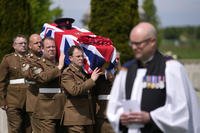The highest levels of Veterans Affairs are examining whether there were any gaps in mental health care for a veteran who is accused of killing one woman and injuring four others in a Midtown medical office, according to a source with knowledge of the talks.
Shooting suspect Deion Patterson had been treated at the Atlanta VA in Decatur for mental health problems since March, according to a second source at the Atlanta VA who reviewed his internal records. He also had scheduled a video appointment with the VA on Wednesday at 2:30 p.m., according to the source — more than two hours after he opened fire at a Northside Hospital Midtown medical office building.
Patterson and his mother were checking in for an appointment at Northside Midtown Medical office building when the shooting took place, according to police. Investigators say he opened fire in the waiting room of the medical office, shooting five women before leading various law enforcement agencies on an eight-hour manhunt that ended in Cobb County.
The Atlanta Journal-Constitution is not naming its sources at the VA because they could be fired for speaking out. Both spoke on the condition of anonymity because they are not authorized to speak publicly about individual medical records or the internal investigation.
Patterson, 24, was discharged from the U.S. Coast Guard in January. The VA has not acknowledged if he was being treated at the Atlanta VA.
According to one source and a copy of the appointments reviewed by the AJC, Patterson had two mental health appointments in March: the first was in-person and the second was a video call. He had two more appointments in April: one in-person appointment, which he never showed up to, and a final in-person meeting with VA medical workers on Thursday. The source said Patterson’s medical records showed his mother, Minyone Patterson, came with him to that final appointment, asking specifically for an Ativan prescription for her son. Ativan is used to treat anxiety and insomnia, among other uses.
In an interview with The Associated Press, Minyone Patterson said her son wanted Ativan but his Veterans Affairs medical team declined to give it to him, fearing he could become addicted. The source told the AJC that Patterson was instead prescribed another drug, Buspirone, which also treats anxiety.
After the shooting, the AP reported Minyone Patterson said her son had “some mental instability going on” from medication that he began taking Friday. It’s not known if that medication was the Buspirone prescription written by the VA.
The FDA frowns on the use of Ativan for “the stress of everyday life,” and says its effectiveness for long-term use has not been well assessed and it is not recommended for continuous long-term use. Ativan can be addictive and going off Ativan should be carefully managed, including being tapered.
“Those families, those families,” Minyone Patterson told the AP, starting to sob. “They’re hurting because they wouldn’t give my son his damn Ativan. Those families lost their loved ones because he had a mental break because they wouldn’t listen to me.”
VA Press Secretary Terrence Hayes said in a statement late Wednesday night, “We are horrified and saddened to hear of the active shooter situation in Atlanta. Due to patient privacy, we cannot discuss the Veteran’s personal information without written consent.”
The AJC reported in late April that thousands of mental health calls to the Atlanta VA have gone unanswered over the past year, according to a recent whistleblower complaint. The complaint, which was obtained by the AJC, alleges that out of roughly 22,000 mental health calls that were made to the Atlanta VA Health Care System over a 12-month period ending in January, about 7,200 went unanswered. The reason, according to the complaint made to the VA office of the inspector general, is that the VA’s Human Resources Department is slow in hiring applicants who can answer the phones. The VA is investigating that complaint.
The whistleblower complaint comes as government officials are bringing increased pressure to improve mental health services for military veterans in Georgia and across the nation. The federal government is doling out money towards suicide prevention, and Georgia lawmakers recently passed a bill that would improve mental health access for veterans in far-flung areas of the state.
But veterans and advocates say the basic systems in place to treat the mental health of thousands of veterans in Georgia are broken.
There is a shortage of therapists in the VA who can treat military veterans in the state, meaning the mental health services are very limited, Jim Lindenmayer, director and founder of the Cherokee County Homeless Veterans Program previously told the AJC. There’s also frequent staff turnover, Lindenmayer said, meaning that even those veterans who are able to secure services often are getting inconsistent care as they switch therapists. He’s even spoken with veterans who have made appointments and the therapists don’t show up.
“Calls are canceled or no one’s there,” said Lindenmayer, whose program serves many veterans who struggle with their mental health. “These veterans have [mental health conditions] that are triggering them already, and the VA is not responsive.”
Staff writer Alexis Stevens contributed to this report
©2023 The Atlanta Journal-Constitution. Visit at ajc.com. Distributed by Tribune Content Agency, LLC.













